HOME | ABOUT US | MEDIA KIT | CONTACT US | INQUIRE
HOME | ABOUT US | MEDIA KIT | CONTACT US | INQUIRE
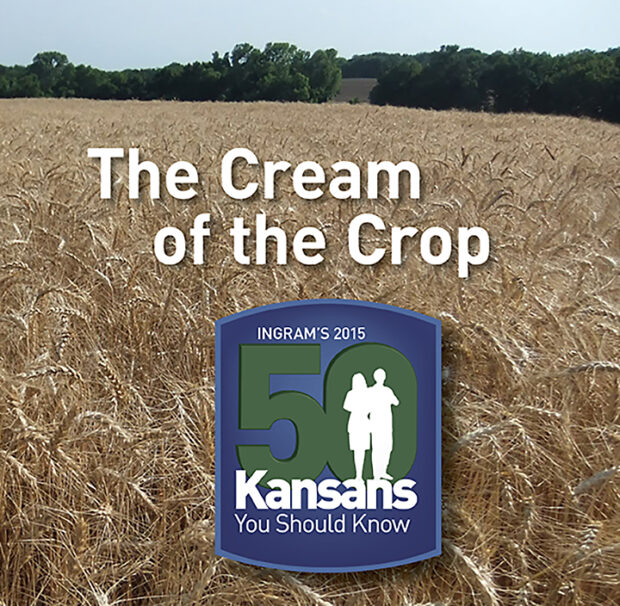
To find these 50 Kansans, we cast an 82,227-square-mile blanket across the Sunflower State.
Time for a little global geography test. Here are a few countries from around the world: Syria. Cambodia. Greece. North Korea. Ireland. Cuba. Switzerland.
Now for the test: What does each of those have in common?
Answer: Every one of them—and 157 other nations on this planet—is smaller than the state of Kansas.
Maybe that helps shed light on the enormity of the annual task of identifying Ingram’s 50 Kansans You Should Know, always a group of highly accomplished individuals, and from all walks of life—business, education, non-profits, cultural, artistic and sporting venues, and many more avenues. In short, each year’s installment is meant to be a cross-section of life in Kansas, told through the stories of the people who make this great state tick.
So it’s worth pausing with this, the fifth installation of 50 Kansans, to see how effective we’ve been in trying to blanket a state of 82,277 square miles. With this year’s group, 250 people from 76 cities and 51 of the state’s 105 counties have made this prestigious honor roll.
Consider that last metric: We’ve brought you bankers, physicians, farmers, ranchers, university presidents, Fortune 500 CEOs, authors, filmmakers, monks, star athletes and many more. And yet there remain 54 counties still to be represented in this feature.
Granted, there are far more communities in the Sunflower State than the 76 explored herein. But for the sake of perspective, note that the 76 largest cities in Kansas account for 1.99 million of the state’s 2.8 million residents. Which means there’s a lot of space out there. And that makes the challenge of spotlighting high achievers in Wallace County (population density: 1.6 per square mile) a tad more difficult than in, say, Hays, where Ellis County has 32.2 residents by that same measure.
What that all comes down to is this: Now 250 strong, our aggregate number of Kansans You Should Know has just scratched the surface. And that’s why, based on what we’ve already learned about these rugged, determined, resilient and successful individuals and the places they call home, we can’t wait to explore the rest of this great state.
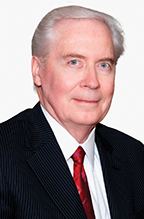
Harvey Dean
Pitsco
Pittsburg
It’s a wonderful cliché in Kansas C-suites: Harvey Dean came to Pittsburg—for one year—to get his master’s at Pitt State. That was 1969. So here he is, 46 years later, leading an educational-services company with 200 employees, producing thousands of products for classrooms nationwide.
He and two other teachers each put up $50 to start the company, and by 1975, he and his wife acquired it all. “Actually,” he wisecracks, “the bank owned the venture with us! Ha.” Maybe, but the Deans, not the bank, had vision, and paired it with what he calls the honest, hard-working, dedicated and unpretentious employees who define that region to craft a national clientele.
Every year, he says, “millions of students in grades 3 through 12 use our curriculum” and Pitsco’s hands-on educational kits.
“I was a terrible student,” Dean says, and lack of hands-on tools was a reason. Today, he says, “I’ve been blessed to travel to schools across the U.S. and see those students having a-ha! moments using Pitsco products. There is no better feeling.”
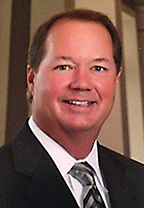
Mike Kilkenny
Taylor Forge
Paola
Maybe there really is such a thing as fate. Ask California-born, Chicago-bred Mike Kilkenny, who earned a degree from the University of Illinois and came to Kansas City at his employer’s behest in 1981. “I never imagined that Kansas City would be my home for the rest of my career,” he says.
Cue fate, with his father’s acquisition of Taylor Forge about that same time. He bought Dad’s interest 18 years ago, and has since built a nine-figure powerhouse, supplying engineering services and making pressure-vehicle products for oil platforms, nuclear power plants, pipeline materials and other heavy-industry applications for clients worldwide.
“What we make is very large and weighs a couple hundred tons,” he says, so each sale entails its own logistical challenge. But even in mid-America, he says, companies can go global. The key for Taylor Forge, he says, was finding great representatives overseas, getting an early win and establishing a foot-hold. Kansas quality and craftsmanship takes things from there.
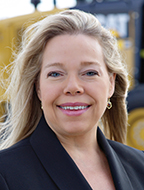
Ann Konecny
Foley Equipment Company
Wichita
In the nearly 20 years Ann Konecny has been leading Foley Equipment Company, she’s overseen a significant expansion of the company’s products and services and the growth of the geographic area served by the dealership.
Konecny represents the third generation of family leadership at the business, which started with her grandfather. She has led the company through two dealership acquisitions, including Martin Tractor Co. in 2009 and Dean Machinery three years later. Today, Foley Equipment has nearly 1,000 employees and has an operating presence in 104 of 105 counties in Kansas and 40 counties in western Missouri.
It sells and services Cat products like skid steers, bulldozers and excavators, but also has focus on rental through Foley Rental, and offers machine guidance, automation and equipment management solutions as well. Now, the company is deepening its roots in the power market with Foley Power Solutions, the engine side of the business. It also has a state-of-the-art engine rebuild facility in nearby Park City.
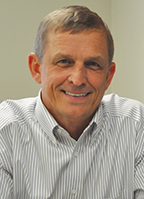
Bill Neighbors
Tank Connection
Parsons
“Simply put,” declares Bill Neighbors, “there is a global preference for American Made capital-equipment products. Our company is keenly focused on doing our part to elevate this preference in the future.” That would be by supplying customers around the planet with dry bulk and liquid storage systems, built at five locations in southeast Kansas.
The company is relatively young, having been founded in 2003. Neighbors attributes its sharp growth curve to the work done by 450 employees. “We have a strong work ethic inherent in our employee base,” he said, reflected in their commitment to faith, families and communities. “When people genuinely care, it is always reflected in their work,” he says.
Earlier this year, Tank Connections became an employee-owned company, one of his proudest moments as an executive.
“Ensuring that our company legacy and core values will stand the test of time,” Neighbors says, “is an accomplishment that will benefit the southeast Kansas area for generations to come.”
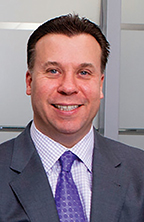
John Olander
Burns & McDonnell
Overland Park
Educational opportunities and work ethic, says John Olander, are the foundations this North Dakota native built in to an engineering career. He’s general manager of the transmission and distribution division at Burns & McDonnell, the engineering firm’s largest division. Fargo’s loss, it turns out, was Kansas City’s gain. “I grew up in a family where everything we could do ourselves, we did,” Olander says.
He came here in 1991, after his wife finished school and landed a job, then started work on his MBA from KU and began a rise through the ranks. Thanks to the firm’s operations and project teams and industry partners, he says, “I have been able to help us successfully execute very large projects with a design-build delivery method in both the United States and Canada.”
He’s actively engaged in outside activities, chairing the City Board for the Multiple Sclerosis Society, and for the Center for Advanced Placement Studies program for the Blue Valley district, where the Olanders’ two daughters go to school.
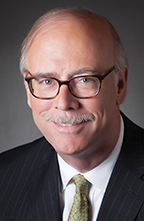
Clay Bastian
Fidelity Bank
Wichita
In a 35-year career at the family’s Fidelity Bank, Clay Bastian has weathered the S&L crisis, the Great Recession and other calamities, and through it all, the president of Fidelity Financial Corp. says, “we always felt like we needed to grow and continue growing” as banking’s economies of scale do the same.
That explains Fidelity’s entry into the competitive Kansas City market last year. “It was a tough decision to make to get into that market,” he says, “but you have to shoot where the ducks are flying.”
His grandfather acquired half the bank in 1942, and his father expanded its reach. Today, Bastian and his brother, Clark (CEO of Fidelity Bank) are Generation 3. As for his two children, Clay says they are interested in banking, but “only when they’re overdrawn,” leaving Clark’s son Aaron, the bank’s new president, to represent Gen-4, at least for now.
Clay’s work in capital markets, particularly with a hybrid vehicle called trust preferred, has been a key to rising past the $1 billion mark in assets, making it one of only nine Kansas-based banks above that level.
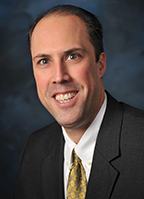
Jonathan Mize
Blish-Mize
Atchison
When the family business survives for four generations, it’s not hard to envision how Generation Five will earn a living. For Jonathan Mize, being able to do that in Atchison is a particular blessing. “The Atchison Community is a special one,” says the CEO of Blish-Mize, a hardware-supply distributor. “Families, friends and coworkers really lift the town up. There is a unique feeling here that I don’t think is replicated in many small towns.”
Last year, he took over the reins of the 145-year-old company, succeeding his father, John. “After college, I tried sales at Overland Park Jeep for about a year, but the hardware business was in my blood,” he says.
His is an industry undergoing huge change. From roughly 200 full-line hardware wholesalers at the start of his career, the field now is about two dozen.
Blish-Mize, he says, has “been around for so many years because we are honest, fair and take care of our customers unlike any other distributor. Having my family directly involved in the business over these many years has helped prolong our success.”
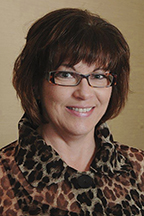
Sheryl Wohlford
Automation Plus
Wichita
It wasn’t a thunderbolt, exactly, that led Sheryl Wohlford to leave one career and start another, working alongside her husband. It was more of a funnel cloud. A big one. “I got my degree in health-care administration, and that was a far cry from helping run a manufacturing company,” says Wohlford, president of Automation Plus. “My husband started the company, and in 1991, our facility was struck by the Andover tornado.”
Doug needed help setting up new facilities, she said, and his creative side deferred to her organizational skills. She took over the day-to-day, and he focused on R&D for Automation, which makes part-marking systems for the aerospace, automotive and medical sectors.
One of the great things about doing business in Wichita, she says, is that “business on a handshake, feeling that still exists,” Wohlford says. “There’s so much integrity and honesty that you feel when you do business and meet leaders in this community. That cliché of this being a small town/big city, I think that still applies to us.”
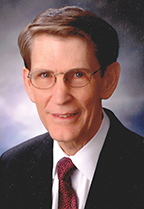
Jim Parrish
Parrish Hotels
Topeka
To make the kind of impact Jim Parrish has made on Topeka, you almost have to live at Cedar Crest—the governor’s mansion. If there’s one figure who embodies the promise and potential of Kansas’ capital city, and has spent a career advocating for both, it’s Jim Parrish.
His considerable achievements earned a 2010 induction in to the city’s Business Hall of Fame, sponsored by Junior Achievement, but chronicling his activities over the past 50 years would fill several magazines. He’s a lawyer, entrepreneur, hotelier, past legislator, commercial property owner and manager, former state securities commissioner and past state Democratic Party chair, board member for the Stormont-Vail Foundation and the parent hospital. And trust us, that’s scratching the surface of his resume.
As a hotelier, he helped lead the revitalization of the Ramada Hotel and Convention Center, among others, and took a lead role to persuade fellow Topekans to pass a half-cent sales tax to fund street improvements.
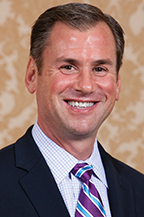
Jim Schwartz
NPC International
Overland Park
Jim Schwartz knows the value of entrepreneurship, and he should: His career and success are intertwined with two of the biggest Kansas names in that field, Gene Bicknell and Fran Jabara. Bicknell created the culture that still infuses NPC International today, where Schwartz is CEO. It’s the world’s largest Pizza Hut franchisee, with 1,250 Pizza Hut units in 28 states and 145 Wendy’s units in five states. And Jabara, founder of what may have been the nation’s first collegiate school of entrepreneurship, at Wichita State University, was hugely influential.
Schwartz would like to see the region get more credit for its business zeal, especially with the contributions from Jabara, a mentor and former board member at NPC, which has grown over the past 20 years in part because of a cohesive, stable leadership team. “We all know what is at stake and what our role is in achieving our goals,” Schwartz says.
A married father of two, he also is a trustee at The Barstow School, the independent college preparatory school in south Kansas City.
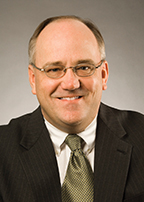
Steve Feilmeier
Koch Industries
Wichita
Koch Industries, the second-largest private company in the U.S., has annual revenues of more than $120 billion—$10 billion more than the combined top lines of the 100 biggest private companies in the Kansas City region. And the numbers guy at Koch is CFO Steve Feilmeier, a transplant from Denver who came to Wichita as a youth, earned his undergraduate degree and master’s in accounting at Wichita State, and stayed put. He started his career at KPMG Peat Marwick, then PepsiCo, before joining Koch 1997. He’s been CFO since 2003.
It was a classic case of the right fit. “The values, beliefs and work ethic of people throughout Kansas and the Midwest are second to none, and align closely with our own core values and principles,” Feilmeier said.
With more than 100,000 employees worldwide—nearly 4,000 in Wichita—Koch directly and indirectly supports nearly $650 million state wages annually, and provides millions of dollars for universities and not-for-profits in Kansas, he notes.
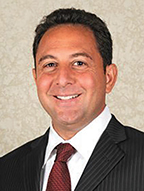
Peter Mallouk
Creative Planning
Leawood
For all the national headlines and acclaim drenching him in the past few years—Barron’s ranking him as the No. 1 individual U.S. wealth manager the past two years, and his firm as No. 1 in the country last year—for the meteoric rise of Creative Planning as a wealth manager for clients nationwide, Peter Mallouk counts his own wealth in a different currency. His greatest accomplishment, “is my family. I am so incredibly fortunate and I know it,” says the father of three and husband of Victoria for 18 years.
But family and career aren’t siloed: “Ultimately, my greatest professional accomplishment is having professional success without it coming at the expense of the more important things in life,” he says.
Mallouk relishes the advantages of being a national player from a base in the heartland. “The people of Kansas City have an excellent reputation nationally as being hard working, diligent and honest,” he says. “That’s true, and it also has made it easier to succeed having so much local talent.”
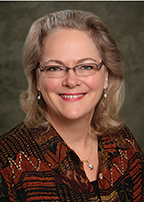
Frieda Mai Weis
PKM Steel
Salina
For Frieda Mai Weis, the chance to lead a company her father founded in 1962 had an appeal that went beyond just making a living: “It was an opportunity for me to continue his legacy,” she said. “To be able to continue that was very exciting.”
After graduating from from Creighton University in 1983 with a degree in computer accounting and administration, she pondered other careers. “But I realized that as the nation grows, growth always meant buildings,” she said. It was also an opportunity create growth of their own by combining complementary skills: her business education and her father’s manufacturing acumen.
PKM Steel fabricates structural steel for industrial and commercial use, with clients nationwide. From Salina, the company can connect with customers in any part of the country, “and it’s a very diverse community as far as talents and skills,” Mai-Weis said. “The work ethic is here.”
Outside of her office, this married mother of two serves on key civic boards, including the Greater Salina Community Foundation and the city’s Chamber of Commerce.
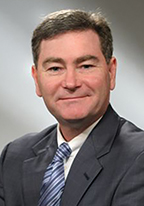
Mark Remmert
Green Dot
Cottonwood Falls
A company called Green Dot is putting Cottonwood Falls on the innovation map, thanks to the work of CEO Mark Remmert, a 30-year veteran with the Dow Chemical Co. Green Dot is expanding the frontiers of bioplastics, with a goal of seizing from the hydrocarbon chain the promise of a cleaner future.
“I believe the next century will be powered by tremendous growth in biologically derived materials—food, fuel, materials, and pharma,” says Remmert. “After all, if you cannot grow it, then it is not sustainable. I thought there was no better place to locate a company seeking to develop bio-based alternatives to petroleum-based chemicals than in my home state of Kansas.”
He grew up in Olathe, and his family’s occasional trips through the Flint Hills would, eventually, pay dividends for Cottonwood Falls and Chase County.
“We have been able to find exceptionally talented people in the rural communities,” Remmert says, and he also credits the Kansas Bioscience Authority with being instrumental in Green Dot’s success.

Jeff Thompson
Vortex
Salina
By twinning his own business acumen with lessons learned working for Koch Industries, CEO Jeff Thompson has led Salina’s Vortex to prominence as a maker of valves for companies that perform dry bulk material handling, and turning into one of the city’s largest private employers.
He was born in Oklahoma, but has lived in more than half a dozen Kansas communities since age 3, including two stops in Salina. Vortex is another example of a Kansas manufacturer with a global reach, with sales offices in Michigan domestically and abroad in England, Switzerland, Mexico and China. Success at Vortex, Thompson says, has followed a sharper focus on the kinds of values Koch embraces.
“The core values, the culture here, I’ve taken a lot from what I gathered and learned” earlier in his career, he says. “What was needed at Vortex—we had the values, they just needed to be defined and re-emphasized,” including respect, integrity, humility and passion.
“They are easy to find in and around our community and our state,” says Thompson, a KU grad, father of four and grandfather of three.
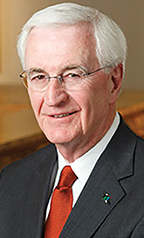
J.V. Lentell
Intrust Bank
Wichita
Growing up in Morris County, J.V. Lentell learned that “people there weren’t afraid of hard work.” He’s vice chairman of Intrust Bank in Wichita, the second-largest of 278 banks operating in Kansas, and you can guess how he got there. “I’ve always said I’m not as smart as the guy next to me, but I can work as hard as he can.”
Born to older parents on that farm near Wilsey, young J.V. took on farming duties at an early age. Eventually, he realized the family acreage couldn’t support two generations. “That dawned on me while I was on a tractor,” he said, “and when I finished that field, I put the tractor away, came to Wichita the next day, enrolled at WSU, and have been here since.”
Much to Wichita’s benefit. He has compiled a rich history of civic engagement, serving with a lengthy roster of organizations, especially Wichita State University, non-profits in civic affairs, cultural venues and health care and education interests. He and his wife of 38 years, Karen, raised three children and have 13 grandchildren and six great-grandchildren.

Julie Browne
GEHA
Leawood
In close to 25 years with Government Employees Health Association, Kansas City native Julie Browne had her hands on a lot of initiatives critical to the growth of the health-insurance provider based across the state line from her home in Leawood. In April, she became the company’s CEO, where she can make a critical assessment of initiatives executed by . . . Julie Browne. “I am most excited about the future of GEHA, and that my team and I get to execute many of the strategies I helped develop over the years,” she said. But the work doesn’t stop there: “We are preparing to launch many new initiatives, expanding our wellness offerings and increasing our networks of providers, all for the benefit of our members”—more than 1.5 million of them in 70 countries.
A K-State grad with a degree in business administration and marketing, Browne also earned an MBA in management information systems from UMKC while working at GEHA and starting a family with husband Steve, a principal at Meara, Welch, Browne.
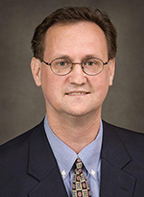
John Guyot
Security Benefit
Topeka
With an economics degree from the University of Pennsylvania’s Wharton School and a law degree from Duke, Johnson County native John Guyot could have worked anywhere. For 13 years, he held law firm and in corporate counsel roles around Washington. When opportunity knocked in 2003, the sound was coming from the west, at Security Benefit in Topeka.
Now general counsel, he’s seen the company regain its vibrancy. He and his wife of 25 years, Janis came back because they thought it would be a good place to raise their two children. “And we thought Security Benefit represented a good opportunity. It hasn’t been without challenge, but it’s been a good move for all of us.”
One key to reviving the company was support of Insurance Commissioner Sandy Praeger and her successor, Ken Selzer. “They were and are demonstratively interested in Security Benefit Life being strong and successful for the benefit of our policyholders and the community,” he says. “That is certainly not the case everywhere.”
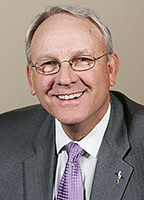
Jerry McReynolds
Farmer
Woodston
Every year, thousands of farm families come together in Kansas for a time-honored ritual. And for the McReynolds clan, the wheat harvest is more than just a special time. “It’s a precious blessing,” says patriarch Jerry McReynolds, whose three children are on hand for it. “Kansas is a great place to raise a family. The farm is a great place to raise a family. We learn about nature, where food comes from, develop a work ethic, stewardship of our land, and have the opportunity to work and play together.”
McReynolds is an outsized figure in Kansas agriculture; a third-generation farmer, he’s been on state-wide and national ag-related boards, often in leadership roles.
Such participation speaks to a farming prerequisite: “Passion for agriculture is a must to make a farm operation successful,” McReynolds says. “A strong work ethic is a must. I enjoy the challenge of developing and maintaining an operation. Innovation is important, with the desire to adapt to continuing changes in weather, price, and regulations.”
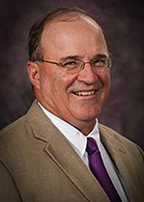
David Nichols
Kansas State University
Manhattan
David Nichols has spent a lot of his time in college classroom and research settings as a professor of animal sciences and industry at Kansas State, but he’s never been far removed from the farm. He was raised on one in his native Indiana, earning his degree in animal science at Purdue University. That’s when he headed west to pick up a master’s at K-State, then his Ph.D., and he’s been a fixture in Manhattan—and in Kansas livestock circles—ever since.
Two years after starting with the K-State’s extension service, Nichols joined the faculty on a combined teaching/research appointment. Today, in addition to advising duties for nearly 100 students, he conducts courses in live animal and carcass evaluation, introductory animal science, and livestock sales management.
That interest carries over with advisory duties at the Little American Royal Showmanship Contest and 4-H, and he was part of a K-State livestock-judging team that once took top honors at the American Royal.
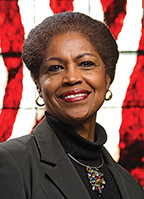
Barbara Ballard
Dole Institute
Lawrence
Normally, you’d think of Barbara Ballard’s job as assistant director of the Robert J. Dole Institute at the University of Kansas.
But 2015 isn’t a normal year, and for 113 grueling days starting in January, Ballard has logged grueling hours at the Kansas House during a record-long 2015 session. It ended in mid-June with passage of the largest sales-tax package in the state’s history, but the toll was steep. Late in the process, after those marathon sessions, she was getting back to her Lawrence home as late as 5 a.m., trying to get a bit of rest in and heading back west for the next round of deliberations.
Ballard is a Democratic representative from the 44th District, which covers west Lawrence and Douglas County, an area she has represented since 1993. The capitol is decidedly more partisan these days than the man for whom Ballard’s workplace is named. In fact, the leadership of the institute speaks volumes about it: A former Dole staffer is its executive director, working across the ideological divide with Ballard to administer its programs.
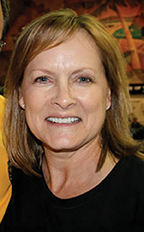
Debbie Haynes
Physician
Wichita
She’s one-half of a medical power couple that for three decades has had a big impact on Wichita, a city of 386,000. That would work out to a 1-in-386 chance that Debbie Haynes helped usher any given Wichitan into this world, assuming they all stuck around: She delivered an estimated 1,000 babies during her first 20 years of medical practice.
By the time she wrapped up her career and retired earlier this year, Haynes had delivered more than a few other notable achievements. She was the first woman to receive the Kansas Family Physician of the Year award, garnering that title in 2012 from the Kansas Academy of Family Physicians, and she was the first woman to serve as the KAFP’s president, in 1989—just a decade after earning her degree from the KU School of Medicine-Wichita.
She and her physician husband, Larry, have been major supporters of Wichita State University, creating a scholarship to help financially struggling students, and she served on the board of the WSU Foundation and its National Advisory Council.
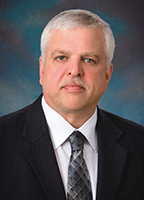
Rick Webb
Watco
Pittsburg
According to his company bio, Rick Webb’s primary responsibility has been the growth and strategic direction of Pittsburg-based Watco since becoming chief executive officer in 1998.
Mission Accomplished: Watco is a big-time player in transportation, offering mechanical, transportation, and terminal and port services solutions for customers on two continents, North America and Australia. One of its subsidiaries, GBW Railcar Services is a 50/50 joint venture partnership with Oregon-based Greenbrier Companies, and recently announced it was adding an office at Corporate Woods in Johnson County, Kansas. The company repairs and refurbishes freight cars at 38 North American locations.
Webb’s rise through the organization may have started with a favorable opinion he made on the hiring decision-maker—his father, Dick Webb, who founded the company—but it entailed years of moving through leadership positions in operations, purchasing, marketing, accounting and financial management.
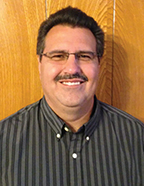
Opie Astorga
National Beef
Dodge City
If you want to understand how immigration is changing the nature of the work force, and of work-force administration, Opie Astorga might be able to provide some key insights. He’s the senior employee relations manager for National Beef Packing, working at the company’s Dodge City location.
That location matters a lot, because Dodge City, according to the most recent Census figures, is 57.5 percent Hispanic—nearly five times the rate of the state overall. The city’s work force is a case study in how the nation is changing, and managing a work force is a big job at National Beef, which employs more than 2,700 workers.
A native of New Mexico, he moved to Liberal as a newlywed in 1981, starting at National Beef. Opie Astorga has risen through the ranks there after starting in production. He’s been actively involved in various organizations to promote cultural awareness, including a stint on the Kansas Human Rights Commission and Dodge City’s Cultural Relations Advisory board.
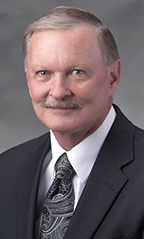
Paul Allen
Allen Gibbs & Houlik
Wichita
“From an early age,” says Paul Allen, “I wanted to own a business, When the Potwin native looked at majors at Wichita State University, “I decided that accounting was the language of business,” and a career path was laid out.
In 1987, he realized his business ownership dream when a team of partners at KPMG established Allen Gibbs & Houlik, Wichita’s biggest accounting and consulting firm. There, he and his leadership team have created a culture of service to both client and community. Growth, he says, “is a byproduct of doing what we think we need to do for our clients, creating services that drive value for our clients.” On the community side, there’s a culture of giving back that finds employees heavily engaged in civic boards, providing donations or volunteering their skills.
In Allen’s case, those efforts are directed at economic development—he’s been part of virtually every ED initiative in town for three decades—and toward his alma mater. He’s a married father of six who says there are few cities that compare with Wichita as a place to raise a family.
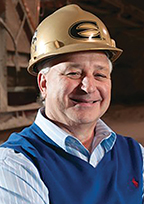
Lee Spence
Underground Vaults & Storage, Hutchinson
He’s part of a thriving underground economy in Kansas—literally. For the past 37 years, Lee Spence has made a living 65 stories below the Kansas prairie, in space carved out by the salt mining operations that have been keys to the Hutchinson economy for a century.
Spence is president of Underground Vaults & Storage, a company that started in 1959 when six enterprising residents decided that a naturally climate-controlled, low-humidity environment could be an ideal storage venue for all manner of businesses.
Today, it boasts a clientele of governments and individuals, museums and private collectors, major film studios and microfilm users, Wall Street moguls and Main street boutiques, even a salt museum, Stratica.
Original copies of Gone with the Wind and the Wizard of Oz? Spence has them, and a lot more. “Millions of films are stored here,” he says. But also a lot from the oil and gas sectors, and government records. “We don’t turn too many things away in the storage business,” the McPherson native says.
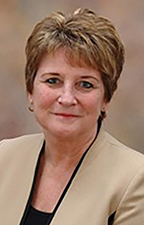
Sue Givens
El Dorado
School District
To get better public schools, the argument goes, get better teachers, and keep them. To a degree, that’s true, but Sue Givens, superintendent of schools in El Dorado, has another take: “I have a strong belief that the key to improving schools lies in the integrity and leadership capabilities of building principals,” she says. “A great classroom teacher makes a difference, but the building principal defines the culture and expectations of the entire school community.”
A native of northeast Kansas, she’s been able to see that dynamic at work in various districts across the state before taking the El Dorado job in 2007. There, she’s found a community that simply gets things done: building a new YMCA, for example, or a new stadium that came from collaborations between city, school district and Butler County Community College.
Some of her biggest achievements in administration came in her current role, helping the district form a long-range facilities improvement plan, and at a previous stop in Pratt, reforming the adviser base program at the middle school there.
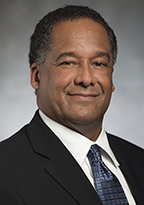
Phil Spencer
Rural Broadband Investments
Overland Park
Long ago, Sam Walton saw economic potential in rural communities and made them the foundation of a retail empire. So Phil Spencer has a good model to emulate with Rural Broadband Investments, which operates in the same kinds of areas, buying, upgrading and selling cable/telecom systems.
“These markets are appealing because the networks are typically capital-starved, services are not robust and the product offering is very weak,” says Spencer, CEO of the company. “The larger players do not invest in these markets because they have smaller populations so they tend to focus on the top-tier markets.”
A native of Milwaukee and a married father of four, he’s been pursuing customers in emerging markets since coming to Kansas City in 1999 for what he expected would be a two-year stay. Five business acquisitions and sales later, he’s still here. “We acquire rural cable systems, so we really like that we are centrally located in the Midwest,” Spencer says. “Midwestern values are also a big part of our culture—hard work, honesty, integrity.”
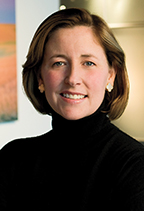
Anne St. Peter
Global Prairie
Mission Hills
East Coast native Anne St. Peter found everything she needed to succeed when she came to Kansas City in 1998: “A generous community with an innovative philanthropic spirit, authenticity, and an extraordinary work ethic,” she says. The value placed on community and service, the world-class art scene—all of those, she says, made it, “a spectacular place to raise family and start a business.”
Those qualities would all come to bear as the former advertising and public relations executive co-founded Global Prairie in 2008, nobody’s idea of a good start-up environment. This region’s assets, she said, were “hugely helpful to me and my team,” and today, with more than 100 employees in seven U.S. offices and Berlin, she says “I’m convinced a large part of our success was because we were in Kansas City.”
She and husband Robert, CEO of the Kansas Health Institute, have two teenage children, and she’s a whirlwind of civic engagement, working on behalf of the Kansas City Area Life Sciences Institute, Central Exchange and Greater Kansas City Community Foundation, to name just a few.
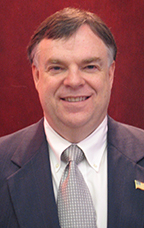
Bill Warren
Warren Theatres
Wichita
Nobody—but nobody—has come to embody the motion-picture experience in Wichita the way Bill Warren has.
In 1989, he shook up the local movie sector by opening the Palace Theater in growing west Wichita, playing movies that were coming off their first-release dates and charging one single United States dollar for admission. It was a stroke of movie-marketing genius, packing the multi-screen complex for years, and not just on weekends. A quarter-century later, the price is up to $3, but that’s still a bargain compared to the first-run shows.
Warren has gone on to build theaters in the city’s Old Town district and in east Wichita, and expanded into suburban Tulsa and Springfield. His signature styling for those venues is art-deco styling, with marble floors and restrooms and staff decked out in 1930’s-era theater garb.
How good is the Warren experience? Flaunt magazine hailed the company as the nation’s best movie-house builder, saying, “Bill Warren of Warren Theatres is a man burning with a mission. Warren wants to build the best cinemas in the world. And he’s doing it.”
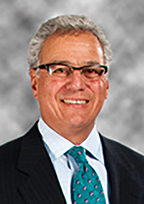
Anthony Isaac
Hyatt Hotels
Wichita
Silicon Valley cranks out software. Detroit still makes cars. And in Wichita, America, they turn out a fair amount of general aviation aircraft—and for some reason, hotel rooms. The city that gave us Jack DeBoer, founder of the Residence Inn chain, and Phil Ruffin, who has gone on to become a hotel magnate in Las Vegas, is also home to Anthony Isaac, now an executive with Hilton Hotels, following the 2011 sale—for $802 million of a company Isaac helped build in Wichita, LodgeWorks.
Though none of its properties were in Wichita, LodgeWorks had something that the bigger chains wanted, but couldn’t do on their own. So the answer was, basically, if you can’t beat ’em . . . buy ’em.
Isaac, who left the board of Westar Energy in April to align with Thayer Ventures, a hospitality-focused venture capital group, was president of LodgeWorks when those 24 units were sold. But the real value of the deal was the development and construction management expertise that he and other LodgeWorks executives could bring to Hyatt.

Mike Lally
Olsson Engineering
Overland Park
“One of the great attributes of Kansas City,” says Mike Lally, “is its welcoming nature. “Not every city is like this.” And that means a lot for business development generally, says the vice president for Olsson Associates, an engineering firm. “In a lot of cities, if you haven’t grown up there and don’t have a long family lineage, it’s hard to get plugged in and engaged and part of fabric of the community.”
Thirty years after coming to this area from his native St. Louis, Lally is indeed part of that fabric. In addition to his role helping cities develop the infrastructure that’s foundational to a high quality of life, something he counts as his proudest accomplishment, he serves on the board for Johnson County Developmental Supports, which benefits those with intellectual impairments, and the Don Bosco center, he’s been on the Overland Park Chamber of Commerce board and served a term on the City Council— even president of his homeowners’ association.
Lally has three children with his wife, Susan.
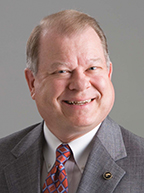
Dale Seuferling
KU Endowment Assn.
Lawrence
The great thing about Kansans, says Dale Seuferling, is the depth of caring they have for their communities and their state, and their sense of giving back. That caring is on steroids with what he calls members of the Jayhawk family. “The KU experience creates a special sense of place, which KU alumni carry with them throughout their lives, no matter where they go,” says the KU Endowment Association’s president.
He’s been with the association for 35 years, the past 13 as president, and has derived three insights from that: “One, people want to support good ideas at quality institutions led by inspirational people,” he says. “Two, philanthropic donors want to make a positive impact in a way that changes people’s lives for the better.” The third? The need to be a great listener to connect a prospective donor with the institution’s mission or cause.
The association exists to encourage private philanthropy for the state’s largest public university, and Seuferling says the team culture his staff exhibits has been a key to making that happen.
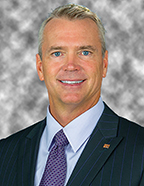
Doug Sterbenz
Present to Win
Topeka
Doug Sterbenz was pretty good at his first career—good enough to reach the C-suites of Westar Energy as chief operating officer, and to be able to retire early last year. And the skills he mastered there led to his second career, as an executive leadership coach through his company called Present to Win (as in the commercial disclaimer, “You must be present to win.”).
“Companies get so caught up in their business, the strategy and getting things done,” he says. “I have found that real, meaningful leadership development is missing in many companies. It’s the people, and their leadership that gets things done, but most companies focus only on things.” Focus instead on the people, he says, and the things will get done.
Sterbenz graduated from K-State and lived in Texas for a decade and Utah for a year before he and his wife came home to raise three children. He’s also been on the board of the American Red Cross for more than a decade. “What we learned is that every place has great and not so good elements,” he says. “What elements you focus on will determine your happiness.”

Lisa Stehno-Bittel
Likarda
Kansas City, Kan.
Lisa Stehno-Bittel is the co-founder of Likarda, a contract research company developing its own groundbreaking product as a potential cure—not a treatment—for diabetes, perhaps the nation’s greatest healthcare challenge.
But she knows she didn’t get there alone. “When you have a scientist with no business background trying to form a company,” she says, guidance from organizations like KU’s Bioscience & Technology Business Center can fill huge gaps.
“They conducted market analysis, built a business plan, and provided advice every step of the way,” says Stehno-Bittel, who was trained as a physical therapist, got her Ph.D. in physiology, but has spent much of her career in diabetes research.
Her formative years were spent in Hays, where her father was a professor at Fort Hays State University. “My husband and I tell people that we grew up in the movie American Graffiti,” she says. Life there taught her that “it was OK to make mistakes and I learned to take risks.”
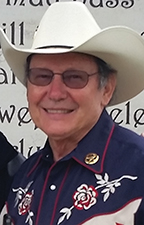
Eddie Estes
Western Kansas Mfg. Assn.
Dodge City
In Kansas, the annual 3i show—it stands for industry, implements, irrigation—is a big deal. A very big deal. And the man who makes that 1,000-exhibitor shindig tick is Dodge City native Eddie Estes, president and CEO of the WKMA. Estes is not just a country boy promoting hardware displays: He holds two degrees from Emporia State and a doctorate in business administration from K-State.
“The greatest strength in western Kansas is the quality and work ethic of the people who are employed here,” says Estes. “There is simply no place like it anywhere.” He and his wife, Cindy also sponsor the Kansas Workforce Summit in Topeka each year in January. Especially in sparesely populated areas, work-force development is vital, and Estes strives to get all the players at the table: business and industry, educators, developers and government officials. All, he says, “need to hear the same story and be together with a common goal. That is the key to a successful economy.”
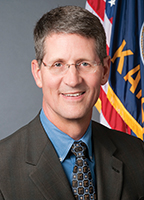
Carl Gerlach
Mayor
Overland Park
He grew up on what was then the fringe of Johnson County’s suburbs. At 6-foot-10 inches per unit, it’s about 772 Carl Gerlachs from his boyhood home west to Overland Park, where for the past 20 years, voters have embrace this son of Leawood for his civic leadership—first on the City Council for a decade, then the past 10 years as mayor.
A Shawnee Mission South and K-State graduate who stood out on the basketball court, Gerlach took the obligatory fling at pro basketball in Europe and the NBA before coming home. He lived briefly in Boston and Chicago before a final homecoming for a job at Gill Studios in Lenexa, where today he’s vice president of marketing by day, and picks up the mayor’s gavel at night.
It was the right move to make with his wife of 38 years, Jill, and they raised three kids, Chris, Jennifer and Katie. “What makes Overland Park an ideal place to raise a family,” he says, “is the partnership between the citizens, the businesses and the city government has kept taxes low while offering a high quality of life.”
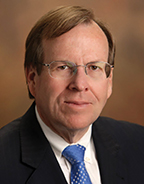
Dave Murfin
Murfin Drilling
Wichita
North Dakota’s Bakken field has been the epicenter of a fracking-fueled energy earthquake in recent years, one that has send temblors running through the oil world as the U.S. rose to become the world’s largest energy producer.
But Kansas and the flatlands of Nebraska and Colorado aren’t exactly dry holes in this environment, as Murfin Drilling Co. showed in 2014. Led by third-generation family member David Murfin, its CEO, the company pulled 2.4 million barrels out of the ground in 2014, up nearly 20 percent from its 2013, which at the time was a record in the nearly 90 years the company has been producing oil and gas, offering exploration services and servicing drilling equipment.
Murfin, who earned degrees in mechanical engineering and business administration from KU, has served frequently on industry boards, but around Wichita and the state, he’s better-known for a wide range of civic boosterism and service. He sits on the board of the Kansas Bioscience Authority, and helped found the Kansas Heart Hospital.
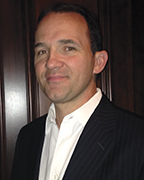
Phil Sarnecki
Northwestern Mutual/RPS Financial
Overland Park
He’s a financial-services executive, husband and father, philanthropist and board volunteer. And one more hat Philip Sarnecki wears: executive film producer, with four movies to his credit, including a pair (Hope Bridge and A Strange Brand of Happy) still available at Wal-mart. This Illinois transplant has a lot going on, and he’s winning on all fronts.
At 34, he was the youngest managing partner at Northwestern Mutual when he bought one of its offices, specializing in wealth management and employee benefits, a decade ago, and came to this area three years later. Because of the friendliness and openness of the area, he says, “I have been able to get very connected to the high-end of the community in a very short period of time.”
Outside the office, he chairs the board of trustees for Athletes in Action, he’s been a 40 Under Forty honoree in both Ingram’s and back in Cincinnati. Sarnecki also nurtures his creative side with Rebel Pilgrim Productions, the film company.
He and his wife, Heidi, have three children.
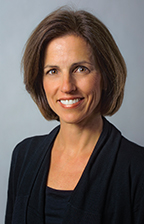
Debbie Wilkerson
Greater KC Community Foundation
Leawood
The giving spirit of Kansans—indeed, of most Midwesterners—presented itself clearly to Debbie Wilkerson early in her career, while still clerking and then starting off as an estate-planning attorney. “I learned what an incredibly creative and generous community we had, and that they were willing to do what it took to make big things happen in our town,” she said.
A desire to immerse herself in that giving spirit led this Kansas City native to the Greater Kansas City Community Foundation, where she’s president and CEO, devoting a portion of her working hours to helping smaller foundations in areas like rural Kansas tap into that same philanthropic vein.
“The spirit is there; it’s just different,” Wilkerson says. “Donors may offer farmland, or other types of gifts, but what’s always interesting to me is the difference between rural foundations and us. Some fantastic philanthropy occurs throughout the state and there are a lot of wonderful professionals working with those donors to make it happen.”
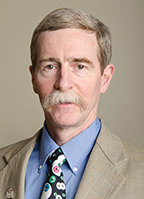
William Clifford
Fry Eye Associates
Garden City
Before he showed up in 1995, Bill Clifford was nobody’s idea of Kansan: Born in New York, educated at the Air Force Academy, and trained as an F-15 fighter pilot. After leaving the Air Force, finishing med school at Southern Cal and doing eye surgery at a Saudi hospital for a year, he and his wife went looking for a place to call home.
“It was in the middle of the country, we liked that, and I viewed it as a place with opportunities, excellent facilities, and for our family, it had diversity—the kids are two white, two black and two brown, and we wanted to go somewhere where multiracial family would fit in,” says Clifford. And with a standup comic’s sense of timing, he adds: “As a minimum criteria, it had a zoo.”
Twenty years later, Clifford has fully embraced the community, as it has him. He was recently elected to the County Commission after 13 years on the Garden City Community College board, has been making a difference at the zoo, too, serving on its board and helping fund an African horned-turtle exhibit.
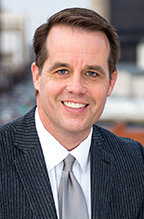
Jeff Fluhr
Wichita Downtown Development Corp.
As it turns out, a little Southern exposure has been good for Downtown Wichita. It came in 2008 in the persona of Jeff Fluhr, a Kentucky native and graduate of UK (not KU) and LSU, who worked for 17 years in Baton Rouge and helped craft its master plan for development. When the Midwest came calling seven years ago, he jumped at the chance to lead a similar process for a city of 386,000 as president of the Wichita Downtown Development Corp.
It’s not the biggest of cities, but neither is it immune from the kinds of issue common to larger cities. Like Kansas City, Wichita is reversing that with hundreds of millions of dollars in public-private partnerships, investing in projects that are drawing residents back and creating a new business dynamic.
The key to success in that, Fluhr says, is a collaborative spirit. “You need to know where you want to go, and an important part of that is collaboration,” he said. And that’s what this married father of two loves about his current role: “It’s that spirit that says we can make great things happen.”
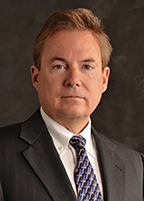
Tim Hickok
Hickok-Dible
Leawood
We will guarantee it: Tim Hickok is the only apartment-building, falcon-breeding, journal-published biologist in the world who has appeared on David Letterman’s show and developed a glow-in-the-dark leopard gecko.
In some ways, he’s just getting started. The president of Hickok-Dible Companies, a fourth-generation contractor and property management firm, is also writing a book on health for seniors-to-be. Most of his career has been in the family trade of construction, and that paid off: “I made an educated guess regarding the long-term decline in interest rates and have stayed with my plan for over 30 years,” he says.
But an itch to get back into biology—he majored in it at K-State—led him to found Nucleic Sciences, a company that might one day market a glowing gecko; a paper on that effort was published in the African Journal of Microbiology Research. “I had this love of animals since I was a kid, and I never got over it,” Hickok says. That love includes falconry, and now he raises and sells them—20 last year, with the crown prince of Dubai as a client.
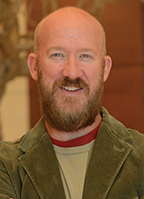
Tim Mispagel
DeSoto High School
Olathe
If Tim Mispagel ever heard someone utter the phrase, “Don’t sweat the details,” it didn’t take. Mispagel, a visual arts teacher at DeSoto High School, is a gifted sculptor and artist whose works take on life-like qualities precisely because he sweats the details. You can see that in practice with his 12-foot statue of St. Benedict—raven at his feet—on the campus of Benedictine College in Atchison, or in the nearly 20-foot Tree of Life sculpture in the lobby of Teva Pharmaceuticals, two pieces of which he is rightly proud.
A Colorado native, he attended Benedictine, and studied at the Kansas City Art Institute. “The lure of art as a career has been present in my life for as long as I can remember,” says Mispagel, who’s been teaching since 1995. And he’s good at that, too: He was the 2005 Kansas Teacher of the Year.
“I take great pride in teaching students valuable life-skills like creative problem solving within my visual art curriculum,” he says. “Teaching art is incredibly fulfilling and it inspires me to keep innovative and progressive in my own artistic pursuits.”
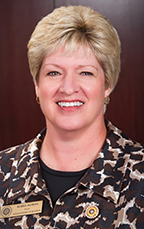
Robba Moran
Kansas Board of Regents
Manhattan
Odometers are the most useless gadgets imaginable for a western Kansan: They know that wherever they’re going, it’s probably going to be a long drive. So after spending 28 years in Hays, city-born Robba Moran has found a bit of a happy medium by relocating to Manhattan a little over a year ago.
“It’s helpful as a member of the board of Regents because I’m closer to the universities, but also because I can be more active in health care and education,” says Moran, a piano-playing former lawyer and professor of business who joined the board in 2013. “Having grown up in Kansas City and living half my life out there, I can appreciate the diversity of both: Health care and education support business and agriculture in the west, and vice versa. We need both for the economy of the state to survive.”
Of course, when you’re married to a U.S. senator—yes, her husband is Jerry Moran—you’re still going to travel. But now, instead of the 63-county 1st District he served in the House for seven terms, she supports him while he’s representing the entire state.
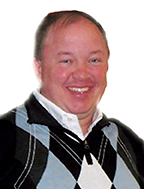
Cliff Earp
Earp Distributing
Kansas City
In 1954, Don and Marie Earp started a small meat company in Kansas City, Mo. Three generations later, it’s not a small meat company, and it’s not in Missouri. Now under the guidance of Cliff Earp, president of the family-owned business, Earp Distribution operates out of a 184,000-square-foot facility located in Edwardsville. The company spent $24 million on that facility that opened in 2011, and already, there are plans for further expansion.
The breakthrough moment in Earp Distribution history may have come in 1962, when it landed orders from a pair of McDonald’s restaurants in Kansas City.
In 1970, McDonald’s requested that the company start distributing to additional restaurants, and with more than just hamburger. Just about everything in each unit is supplied by Earp, which today delivers to Wichita, Joplin, Springfield and most of Nebraska, delivering frozen, refrigerated, dry and promotional products to more than 420 McDonald’s locations and 50 Chipotle restaurants in the region.
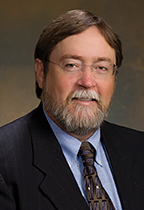
Lloyd Huff
Rawlins County Sqaure Deal
Atwood
An aerospace career in Texas and Utah with General Dynamics and its successors called Lloyd Huff away from Kansas after he finished his degree at KU. But he never cut the cord with Atwood: He kept his boyhood home even after his father’s death, made several visits each year to see friends and relatives—he even kept a subscription to the local newspaper since 1973.
So folks in Atwood hardly looked at him as an outsider when he retired and came back to purchase the Rawlins County Square Deal with his wife, Susan. It was, he said, “an opportunity to hopefully give back to the town that nurtured me and started me off on the right track. The work ethic, personal integrity and can-do attitudes I received helped me every day of my working career.”
He came back to a town with a new vibrancy. “The biggest change,” Huff says, “was in the demographics of the town and the turn from slow-but-steady decline, to slow-but-steady recovery and growth,” as demonstrated by a need for more teachers at the local elementary school.
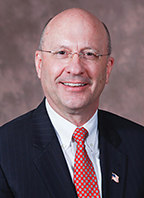
Greg Musil
Lawyer
Leawood
Growing up on a farm near Frankfort, Greg Musil says, “may be the best way to teach self-reliance, initiative and teamwork.” That last one is particularly relevant to his work today, as a lawyer with Douthit Frets Rouse Gentile & Rhodes.
Back on the farm, “we learned to rely on one another and we were encouraged to come up with solutions to myriad problems,” he says. “You didn’t want to let the other team members down, and that was a great motivator.”
As lawyer, he says, “I have to work with people to find a resolution,” even when compromise isn’t possible. But “trying to find the truth and then trying to find common ground is how most of life works,” and it’s what lawyers should strive for, he says.
He’s particularly proud of his in leading Johnson Countians for Justice in a two-year campaign against the partisan election of judges in Johnson County in 2008, and he was a recipient of the county Bar Association’s Justinian Award, recognizing integrity, service to the community, and service to the legal profession.
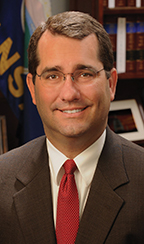
Derek Schmidt
Attorney General
Topeka
If public service in Kansas is your calling, it helps to have mentors like Nancy Kassebaum, Carla Stovall and Bill Graves. Derek Schmidt has brought the influence of all to his role as Attorney General since 2011, and to the Kansas Senate before that.
A KU journalism and Georgetown law graduate, he cites as a key achievement Senate passage of Jessica’s Law, ratcheting up penalties for sexual abuse of minors. In his current role, he’s been able to build a staff that can act on its provisions. “That is the crime of our generation for those of us in criminal prosecution,” he said. “I get a lot of satisfaction in improving our state’s response to that.”
He also takes satisfaction for helping save the Alf Landon home in Independence, his hometown, from demolition. He’s married, raising two girls in a state where authors have often said people draw strength from the absence of mountains and oceans. “When you grow up here,” he says, “you can dream as big as you want, and if you dream it, there’s nothing to stop you from going and doing it.”

Carol Wei
Asian-American Culture Assn.
Olathe
The Asian population of Kansas has more than doubled in the past 25 years, pulling in new Kansans from China, Korea, Vietnam, the Philippines, Japan, India, Pakistan and other locations, she notes. So instead of a single cultural flavor, Carol Wei says, there is “a cultural soup in which each culture is distinct yet supportive of their sisters.”
Since arriving in the U.S. from her native China seven years ago, Wei has personally confronted the challenges of immigration: not just the language barrier, she says, “but adjusting to American media, commuting by automobile, and understanding American values all present an intimidating picture to the newly immigrated.”
She addresses that as the director of the Asian-American Cultural Association, an organization that, to her surprise, has been roundly supported by local businesses. “I have received tremendous support from many companies in the Kansas City metro area,” says the married mother of two.